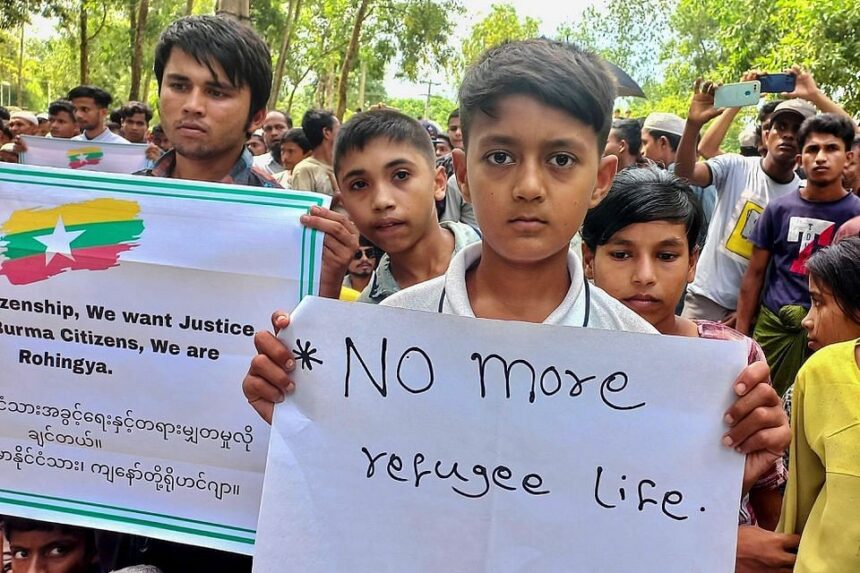
Written by:
AKM SAYEDAD HOSSAIN
Executive Director
National Institute of Global Studies (NIGS),
A Bangladesh-based think tank
https://nationalinstituteofglobalstudies.com
Introduction
The Rohingya crisis remains one of the most pressing humanitarian challenges in South Asia, with nearly 2 million Rohingya refugees residing in Bangladesh. Since the mass exodus in 2017, when Myanmar’s military launched a brutal crackdown on the Rohingya in Rakhine State, Bangladesh has shouldered an immense burden, providing shelter, food, and basic necessities for these displaced people. While Bangladesh has made significant efforts to manage the crisis, a long-term solution hinges on the safe, voluntary, and sustainable repatriation of the Rohingya to Myanmar. The United States has played a crucial role in supporting Bangladesh’s humanitarian efforts, advocating for justice, and attempting to facilitate a durable solution. However, progress has been slow, with geopolitical complexities and Myanmar’s resistance creating significant roadblocks.
U.S. Humanitarian Support and Diplomacy
The U.S. has been the largest donor to Rohingya relief efforts, contributing more than $2 billion since 2017 to humanitarian assistance for Rohingya refugees and affected host communities in Bangladesh. This aid has been channeled through international organizations like the United Nations High Commissioner for Refugees (UNHCR), the World Food Programme (WFP), and the International Organization for Migration (IOM). Key areas of U.S. humanitarian support include:
- Food and Nutrition Assistance: Ensuring Rohingya refugees receive adequate food rations and nutritional support, particularly for children and pregnant women.
- Health Services: Funding hospitals, vaccination programs, and medical teams to combat diseases in the overcrowded camps.
- Shelter and Infrastructure: Providing funding for better housing, sanitation, and clean water to improve living conditions in Cox’s Bazar and Bhasan Char.
- Education and Vocational Training: Supporting informal education programs and skill-building initiatives for Rohingya youth.
While these efforts have been essential in addressing immediate humanitarian needs, they do not address the root cause of the crisis: the lack of a viable repatriation process.
U.S. Pressure on Myanmar for Accountability and Repatriation
The Trump administration, and now the Biden administration, have both taken strong positions against Myanmar’s military. In 2021, the U.S. formally designated the actions against the Rohingya as genocide and crimes against humanity, increasing international pressure on Myanmar’s military regime. This move was intended to rally global support for justice and push for stronger measures against Myanmar’s leadership.
Key U.S. diplomatic efforts include:
- Sanctions on Myanmar’s Military Leaders: The U.S. has imposed targeted sanctions on key figures in Myanmar’s junta, limiting their financial and international mobility.
- Engagement with ASEAN: The U.S. has worked with the Association of Southeast Asian Nations (ASEAN) to increase diplomatic pressure on Myanmar, though progress remains limited due to Myanmar’s close ties with China and Russia.
- Encouraging Third-Country Resettlement: While the U.S. supports repatriation as the ultimate solution, it has also taken steps to resettle some Rohingya refugees in the U.S. and other countries as an alternative for those unable to return to Myanmar.
Challenges in Repatriation Efforts
Despite diplomatic pressure and financial aid, Rohingya repatriation remains a distant goal due to several challenges:
- Myanmar’s Reluctance: The military regime in Myanmar has shown little willingness to create safe conditions for the return of Rohingya refugees. Repatriation agreements between Bangladesh and Myanmar in 2018 and 2019 failed due to a lack of guarantees for the refugees’ safety and citizenship rights.
- Lack of International Consensus: While the U.S. and some Western countries have condemned Myanmar’s actions, China and Russia have shielded Myanmar from stronger international actions at the United Nations Security Council (UNSC).
- Security Concerns: The situation in Rakhine State remains unstable, with ongoing armed conflicts between Myanmar’s military and ethnic armed groups. Rohingya communities fear renewed persecution upon return.
- Humanitarian Strain on Bangladesh: Hosting nearly 2 million refugees has put enormous pressure on Bangladesh’s economy, environment, and social fabric. Dhaka has repeatedly urged the international community to push for a concrete repatriation plan rather than indefinite aid dependency.
Future U.S. Role in Securing a Sustainable Solution
Going forward, the U.S. can take several steps to enhance efforts for a sustainable resolution to the Rohingya crisis:
- Stronger Sanctions and Diplomatic Pressure: The U.S. could lead a more aggressive international push, imposing broader economic sanctions on Myanmar’s military-linked businesses and pushing for an arms embargo through the UNSC.
- Increased Support for Bangladesh: While the U.S. has been a key donor, further economic and security cooperation with Bangladesh would help mitigate the burden of hosting Rohingya refugees.
- Advocating for a UN-Monitored Safe Zone: A possible solution could be the creation of a UN-monitored safe zone in Rakhine State, where repatriated Rohingya could live under international protection.
- Leveraging Regional Powers: The U.S. should work more closely with regional players like India and Japan to exert coordinated pressure on Myanmar, given their strategic interests in the region.
- Expanded Resettlement Programs: Encouraging third-country resettlement for some Rohingya families, particularly those most vulnerable, could ease Bangladesh’s refugee burden.
Conclusion
The Rohingya crisis is a humanitarian and political challenge that requires sustained global commitment. The U.S. has played a leading role in providing aid, advocating for justice, and pressuring Myanmar’s military. However, without concrete measures to ensure a safe and dignified return for the Rohingya, the crisis will persist, with long-term implications for regional stability. Bangladesh, despite its generosity in hosting the Rohingya, cannot bear this responsibility alone. As the crisis enters its seventh year, a renewed and more decisive international approach—led by the U.S.—is essential to achieve a sustainable and just resolution.




